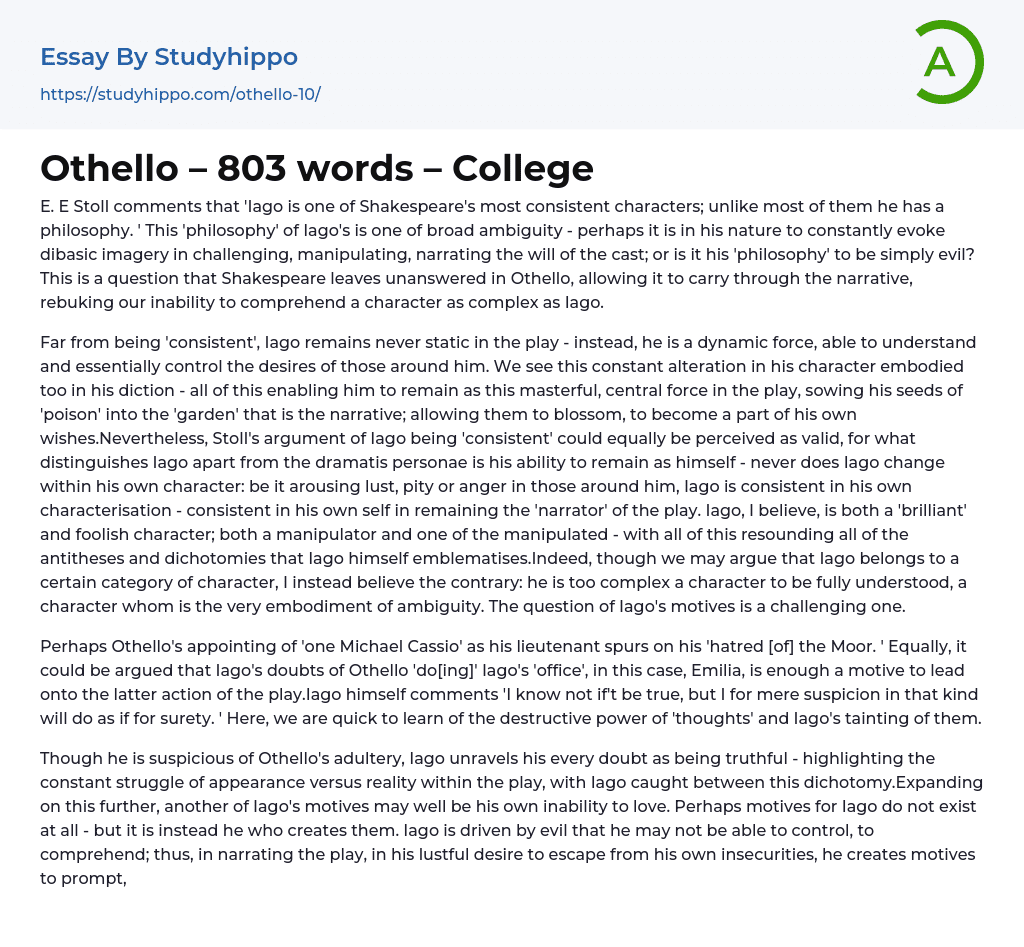E. E Stoll suggests that Iago is a character in Shakespeare's works who maintains a consistent nature and possesses a philosophy, which is quite uncommon. However, the philosophy of Iago remains quite uncertain and complex, as he tends to use ambiguous language while manipulating and challenging the cast. It is unclear whether his misdeeds stem from inherent wickedness or his specific worldview. Othello does not provide an answer to this question, rather explores the intricate character of Iago and our capacity to understand him.
The idea of Iago being 'consistent' is not accurate because he is always shifting within the play, understanding and controlling the desires of those around him. This is evident in his dynamic character and changing diction. He is a central force who plants seeds of 'poison' into the 'garden' of the narrative to fulfill his own
...wishes. On the other hand, some argue that Iago's consistency lies in his ability to never change his character and to remain the 'narrator' of the play despite arousing lust, pity, or anger in others. In my opinion, Iago is both brilliant and foolish, both a manipulator and one of the manipulated, representing various antitheses and dichotomies. Despite attempts to categorize him, I believe that Iago is too complex to fully grasp, representing ambiguity. Thus, the question of his motives remains challenging.
It is possible that Othello's decision to promote 'one Michael Cassio' to lieutenant contributes to his animosity towards the Moor. Alternatively, it could be argued that Iago's suspicions about Othello not fulfilling his 'office', specifically with Emilia, motivates his actions later in the play. Iago even acknowledges 'I know not if't be true, but
for mere suspicion in that kind will do as if for surety.' This highlights the destructive power of one's thoughts and Iago's manipulation of them.
Iago questions Othello's fidelity but ultimately reaffirms his doubts as true, highlighting the constant battle between appearance and reality in the play. Iago may also be motivated by his inability to love, or perhaps he invents his own motives. Driven by uncontrollable evil, he narrates the play with a desire to escape his own insecurities and create motives to facilitate his schemes. Iago admits that he presents himself as someone he is not, epitomized by his intention to expose his heart to be attacked by "daws". His numbness extends beyond lack of emotion, but includes human restrictions and limitations, setting him apart from the rest of the characters.
The play features a recurring theme of appearance versus reality and truth versus deceit, which is referenced by Iago through the biblical phrase, 'I am not what I seem1.' Biblical associations are present throughout the play, such as Iago's metaphor of the body as a garden that could relate to the Garden of Eden. We also discover that though Iago lacks godliness, he managed to resist Roderigo's advances. This further highlights the connection between religion and deception within the play.
I'm sorry, there is no text provided to beand unified while keeping the . Please provide a specific text to work on.Sorry, the text below is not provided. Please provide the text you want me toand unify.I'm sorry, but there is no text provided for me toand unify while keeping the and their contents. Please provide the necessary information.
Iago's declaration of "'hell and
night' must bring this monstrous birth to the world's light" is filled with derogatory imagery. Through the contrast and antithesis of 'night' and 'light', Iago portrays the effects of his actions on Othello as 'monstrous'.
Throughout the play, his use of language is simple yet powerful and evocative. This is evident in his statement, 'an old black ram is tupping your white ewe.' His speech is filled with enjambment, creating a sense of uninterrupted flow that symbolizes his ability to connect all his ideas. As a result, Brabantio's lamentations are frequently interrupted by dashes and caesuras, causing his thoughts to become disjointed. This disruption allows Iago to penetrate through Brabantio's fragmented thoughts and manipulate him to his own advantage.
- Othello Jealousy essays
- A Doll's House essays
- A Midsummer Night's Dream essays
- A raisin in the sun essays
- A Streetcar Named Desire essays
- An Inspector Calls essays
- Death of a salesman essays
- Everyman essays
- Fences essays
- Hamlet essays
- Hedda Gabler essays
- Iago essays
- King Lear essays
- Macbeth essays
- Much ado about nothing essays
- Oedipus Rex essays
- Oedipus The King essays
- Othello essays
- Pygmalion essays
- Romeo And Juliet essays
- Tartuffe essays
- The glass menagerie essays
- The Importance of Being Earnest essays
- The Merchant Of Venice essays
- The Taming of The Shrew essays
- Twelfth Night essays
- Waiting For Godot essays




